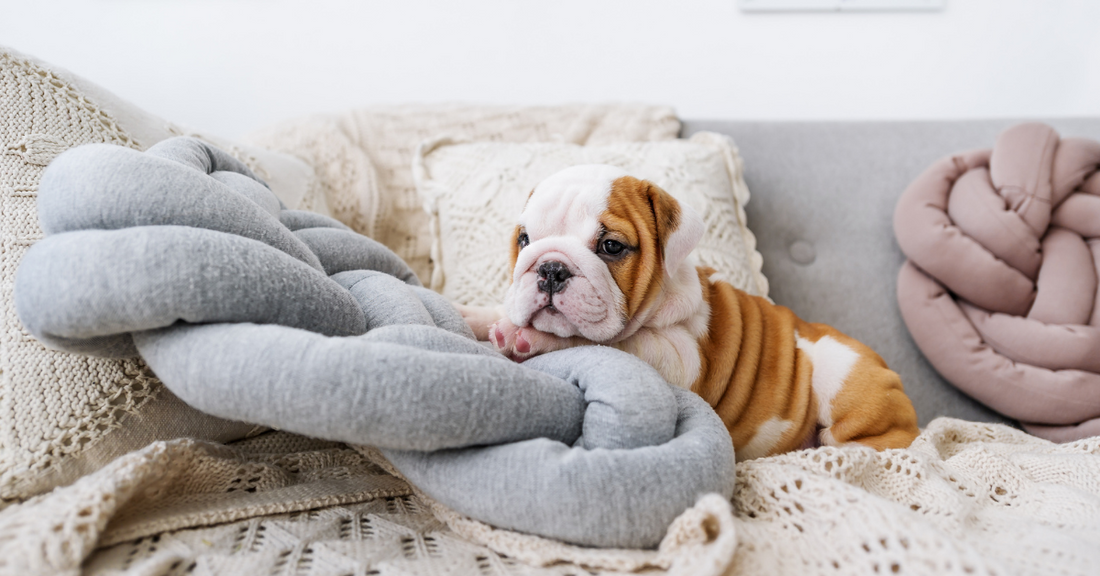
The Ultimate Guide to Owning a Puppy in the Philippines!
Share
Are you thinking of getting a puppy or just got one? Congratulations on becoming a fur parent or taking the steps to become one. Just like being a hooman parent, fur babies are similar to a hooman child in a way that you'll need to dedicate time, money, work on behavior, and a have a lot of patience. All of this can be very overwhelming, but we're here to help you prepare and get you started. We made a comprehensive list on how to be an amazing fur parent.
1. You're in it for a life time!

Before you decide on buying or adopting a puppy, know that owning one is a full-time job and requires a lot of time during their puppy phase. You will need to dedicate a lot of time, care, and attention so be sure you can give that to your new or incoming fur baby.
Once you own a puppy, they'll become part of your routine. These little fur babies can wake you up early in the morning or have accidents indoors. Always be ready to clean and be woken up when they need to pee. These little roomies can also leave presents in hard to reach areas so always keep track of where they roam. Owning a puppy also requires exercise as they like to play and socialization to make play safe. Remember, you'll have to dedicate your time for a lifetime, so be sure you can give them the love and attention they deserve.
Just like adults, when dogs mature, they will need less maintenance and should be easier to manage compared to puppies. It'll be worth it!
2. Don't go with the trend. Find the right puppy for you.
It is very important to do your own research when buying or adopting a puppy. Some breeds may work better for others, but may not work for you. Some puppies might look really cute but their temperament and energy level may not match with your lifestyle. Note that some breeds require experience before raising.
Some things to consider when choosing the right puppy include:
- Size: It is important to match the size of your dog with your living space. If you live in a small studio, it wouldn't make sense to own a St. Bernard. Dogs need space. A high energy dog would not mix well in a cramped space.
- Activity Level: Dogs all come in different activity levels. Some may be low energy and would be content being a lap dog like a Shih Tzu while others feel the need to run a marathon like Belgian Malinois.
- Breed Group: Always consider the breed group when owning a puppy. Certain groups might not fit your lifestyle. If you're not willing to dedicate time when owning a Working Group breed, it might have a negative outcome.
- Fur or hair type: Hair matters. If you're okay with getting hair all over you, your clothes, house, and wherever they roam, go for it. Some breeds don't shed and might work better with others. If you can't dedicate a lot of time when grooming, consider dogs that don't shed as often. The longer their hair, the more you'll spend on grooming as well.
- Allergies: If you're lucky and you're not allergic to dogs, great! If you are, it would be best to explore hypoallergenic breeds.
- Children: Some breeds might work better with children compared to others.
- Barking: Be ready for barking. Some breeds tend to bark more than others. There are some breeds who also do not bark and might be a better fit for you if you live in an apartment.
- Other pets: It is important to carefully introduce your new fur baby to your other pets. Always be aware of what your puppy is doing and how your other pets treat your new fur baby.
3. Buying or adopting your puppy.

If you decide to buy instead of adopting a dog, be sure you're buying from a legitimate breeder with proof of transactions. Try to find someone willing to meet or hire a reliable third-party to handle the exchange properly. If you can, visit the kennel too to see how they're being raised. Always take due diligence when buying as some may even scam you by not giving you the dog after you place a deposit or others might knowingly give you a sick dog.
When buying or adopting a puppy, it is common practice to take them at 3 months or older. It is not advisable to buy a puppy under that age as they are more prone to diseases and will still need to nurse from their real fur mom. Note that Aspins and Mixed Breeds tend to be healthier compared to pure bred dogs.
4. Puppy-proof!

Now that you've found the right puppy and breed, be sure to also prepare your home for you new fur baby who'll now be your roomie.
- Remove fragile objects from places they can reach. These little explores might accidentally knock them down.
- If you have steep stairs or a pool, a gate is a must so they don't accidentally explore places they shouldn't go to.
- Be sure to remove any plants that are poisonous to dogs. You may refer to an older article of ours about toxic plants to avoid.
- Dogs go through teething and will chew on anything and everything. You can counter this by using sprays that can be found at your local pet store.
- If you have your own laundry machine, keep them away from dryer sheets as these are toxic to dogs.
- Hide anything you don't want your puppy to destroy.
- Pay attention to anything electrical that your dog might want to use as a toy. Make sure they don't go near batteries.
- Teething toys.
- Hide your trash.
- Move your medicines and potentially dangerous chemicals to places where your dog can't reach them.
- Avoid leaving food.
5. Stock up on puppy supplies.
Get some gear before they arrive. Here's a list of some essentials you will need:
- Puppy food is important since the kibbles are smaller and easier for them to eat.
- Stainless steel food and water bowls. Puppies like to bite on things so it might be best to avoid plastics.
- Puppy treats
- Puppy collar - note that they will outgrow them.
- Long leash for training
- Potty training pads
- Biodegradable Poop bags
- Toothbrush, toothpaste, and dental treats
- High quality grooming supplies
- Dog bed or dog crate
- Cleaning tools for accidents
6. Find a veterinarian.
It is very important to find the right veterinarian for your fur baby. Owning a dog, especially a puppy, truly is like raising a child. It's best to find your own reputable in event you need their help for an emergency. It is also a good idea to find one before your fur baby arrives or moves in so you know where to take him or her when they need their first wellness visit, vaccinations, or routine check-ups.
7. Have your first wellness visit with your vet.

Great! You've found the right vet and now it's time to get your puppy checked and vaccinated.
- Let your vet know what dog food you’re feeding your puppy, treats, and other supplements you are giving them.
- Ask for a vaccination card.
- Make your next appointment.
In the Philippines, it is common for dogs to get worms, ticks, and fleas. It is common for vets to deworm your puppy. Don't freak out when you see worms in their poop. That just means the medicine is working. Also be on a look out for ticks and fleas that may try to latch on to your precious fur baby.
8. Teething.

When our Doberman was a baby, she would munch on anything she can get from shoes to the couch. Teething is part of growing up but you can definitely invest in anti-chew spray, which keeps that away from chewing on things. It is important to also buy them a teething toy and treats to help them with their teething.
9. It's time to make friends.
It is very important to properly socialize your puppy, but only do so when they are fully vaccinated. Compared to adult dogs, puppies are easier to socialize. It is important to do this so they can get along with other dogs when taking them out for a walk.
- Introduce them to new dogs.
- Taking them to a daycare where they can interact with other dogs.
- Meet up with other fur parents.
Most importantly, let your puppy socialize with other people. The more they are socialize with hoomans, the better they are at being around with hoomans. Start small by introducing your fur baby to close friends and family then slowly introduce them to strangers. Use treats to reinforce their good behavior too!
10. Don't give up on your puppy and love them.

Imagine yourself moving from one island to another - that's how puppies feel like when leaving everything familiar to them for something new. It takes time for your puppy to get used to their new home and adjust to their new environment. Be very patient with them and show them a lot of love. If it gets hard, try harder. Don't re-home your puppy just because you feel defeated.
Your puppy will become not only your best friend, but your family member. Once you overcome the challenges, they'll give you unconditional love for a lifetime. Dogs are truly angels on earth and will give you lots of love, so love them back and give them your all!
